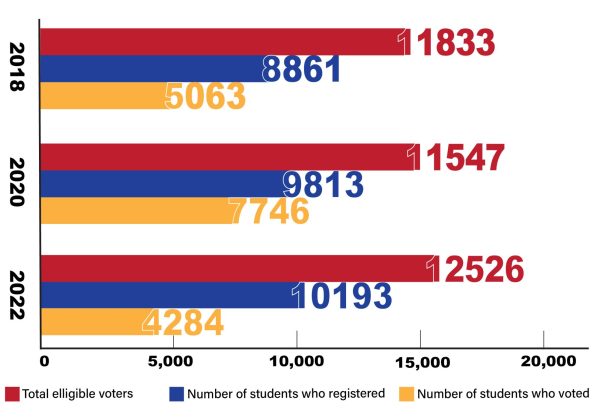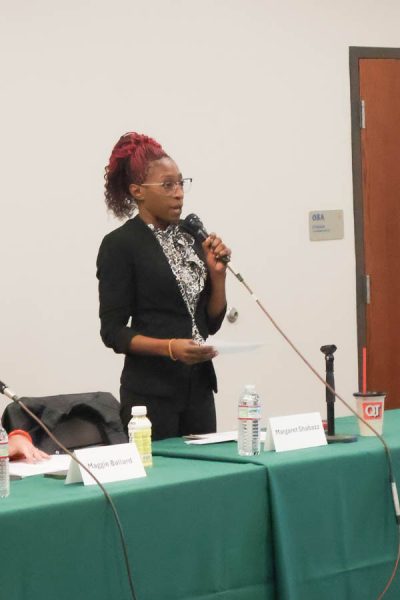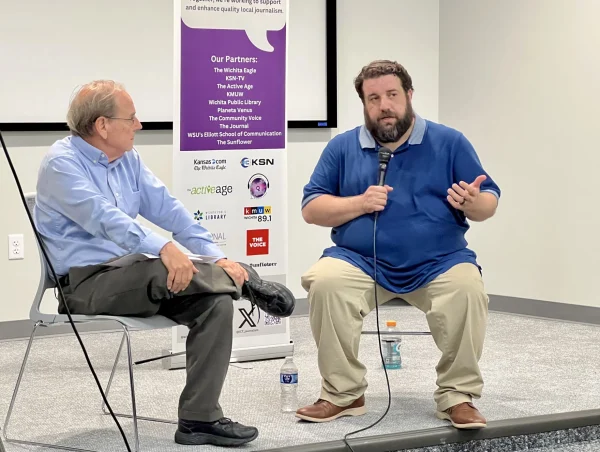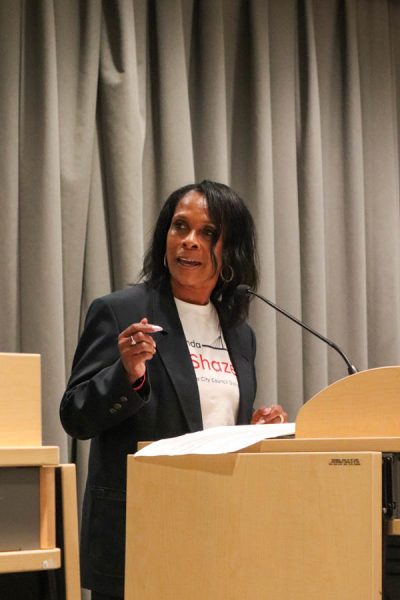Student veterans say WSU Foundation is costing them donations
A group of student veterans at Wichita State are concerned that current university policy surrounding donations to recognized student organizations (RSOs) is limiting their ability to fundraise.
Levi Schenk, president of the Student Veterans Organization (SVO), Student Body Vice President Michael Bearth, and SVO staffer Eugene Potts spoke to The Sunflower about their concerns that current policy is costing the organization money.
“If anyone wants to donate money to us . . . it goes to the Foundation account, and WSU takes a part of that money for themselves,” Schenk said.
Donations to any organization at WSU must go through the WSU Foundation, which takes a 5% management fee from all contributions across the board. The fee was established four years ago.
“It’s not like they’re just targeting our organization for it,” Schenk said. “But (some) other veteran organizations [at] other universities have an agreement that their donors don’t need to go out of their way to ensure that the veterans organization gets all the intended money for the organization.”
Mike Lamb, vice president of planned giving with the WSU Foundation, said SVO has not approached the foundation to raise concerns about gifting policies.
At WSU, donors who ask to give to student veterans without contributing to the Foundation will hear a definitive no.
As students who chose to use their G.I. Bill benefits at WSU, SVO members said they feel the university should grant them certain allowances.
“Certain agreements should be made that if people donate to our organization, the money comes straight to us,” Schenk said.
Bearth said that the question of fee waivers is not just a theoretical one. He said it’s affecting would-be donors’ relationships with SVO and causing some to take their money elsewhere.
“Within the first few years that I was here and involved with the student veterans, we did have a few people that wanted to (donate),” Bearth said. “We walked them through what we knew and then put them in touch with the individuals that they would have to walk through the financing process — after reviewing what they would have to do, they decided to back out, and so we actually lost money.
“We lost out on receiving additional funds.”
Asked whether the foundation’s maintenance fee had cost organizations donations, Lamb downplayed the potential impact.
“As we explained the purpose of that fee, donors by in large understand and accept that that’s just the cost of doing business for our operation,” Lamb said.
Other Options
Keith Pickus, vice president for development at the WSU foundation, said the foundation introduced a crowdfunding platform about two years ago to address “smaller-level campaigns either by faculty or student groups.” Information about crowdfunding is available on the foundation website.
“To the best of our knowledge, the Student Veterans Organization has not initiated any efforts on that platform yet,” Pickus said.
When asked by The Sunflower, Bearth said he had no idea crowdfunding was an option for student orgs.
“I am not aware of this at all,” he responded in a message.
Lamb said the foundation put out several releases about the platform and tried to educate student organizations.
“Our point person who works with the crowdfunding platform was there making presentations about the availability of this tool when they had the meeting for recognized student organizations earlier this fall,” Lamb said. “So we did present specifically to our S.O. group about the funding platform.
Gifts given through the crowdfunding platform are assessed a 10% fee, which Lamb said cover the cost of working with the platform vendors.
Otherwise, student groups aren’t allowed to solicit donations.
“No entity on campus — be it an individual, a student organization, faculty member, or the president for that matter, can fundraise outside of the purview of the foundation,” Lamb said.
But unlike monetary donations, student organizations can receive gifts in-kind directly.
As a result, the SVO holds events where people can donate without the SVO specifically asking for money.
“Most of our events have been donation-based events — we’re not selling anything. We have products, and people can choose to donate,” Schenk said.
Lamb said the foundation is willing to take a more hands-on approach to identifying fundraising options for student orgs.
“With SVO, as well as all the recognized student organizations, we’ll be happy to work with them and try and partner and identify solutions to help meet their needs and engage with them in fundraising activities in any way that we can,” Lamb said.
But the foundation tends to focus on fundraising for university-wide initiatives, he said.
“Typically, we’re not involved in fundraising activities for student organizations. Generally, that’s coming from, as I understand, the student-fee allocation.”
But Bearth told The Sunflower that although some groups can apply for student fees directly, RSOs like the SVO cannot.
“This is how [Mikrokosmos], Formula and Baja teams, etc. are funded,” Bearth wrote in a message. “However, as a recognized RSO, the SVO can only apply through SGA to receive a fraction of the amount these orgs/clubs receive.”
Right now, SGA can only allocate up to $1,850 to an RSO each year, Berth said.
Potts called into question the university’s fundraising priorities.
“I’ve seen capital campaigns directed at the business school. I’ve seen capital campaigns,” Potts said. “I’m aware that we had a capital campaign for the RSC. I’ve seen a capital campaign for the YMCA. What’s the priority? Are they raising money just for the perceived money-making parts of the university?”
The Sunflower confirmed that one potential donor had raised six figures in funding for WSU student veterans in 2018 but later decided against the donation. The donor, whose identity is being withheld, said they walked away due to concerns about giving money to the Foundation.
It’s unclear if the allegedly lost donations are unusual, an ongoing problem, or misinterpretation. If the university policy is driving away donors, it would be difficult to prove without potential donors speaking on the record.
‘Cost of doing business’
Lt. Col. Art DeGroat (retired, U.S. Army) is the founder and executive director of the Office of Military and Veterans Affairs and the Military and Veterans Affairs Innovation Center at Kansas State University.
“I am an expert in university and military and Veterans Affairs. I’ve been doing it for about 19 years,” DeGroat said. “And I have been consulting all over the country with a lot of major universities as they were building their military veterans affairs also, so I’ve got a comparative insight on other institutions, as well.”
DeGroat said he was a founding member of the Kansas military alliance, which usually includes the senior military and veteran official from each university in Kansas.
“We talked about these kinds of policies,” DeGroat said. “The public universities are governed by the Kansas Board of Regents, and so there’s a lot of regents-level rules on all these things.”
In some cases, DeGroat said private schools can give more leeway to student veterans.
“Some private schools will give free room and board to veterans or military ROTC cadets, for example. But in the state of Kansas, that’s not permissible by law [for public universities].”
K-State also has a 5% fee for donations, but the relationship between the KSU Foundation and its military and veterans groups appears different from WSU — especially with regard to the Foundation’s focus on fundraising for the Veterans Center.
DeGroat said K-State manages its donations differently than WSU.
“The first is how student organizations are — the status that they have on campus,” DeGroat said. “I think a couple of years ago, all Kansas public schools, they had a new rule on regulating student organizations, and there’s two or three different levels of affiliation that they have. This includes fraternities and sororities, cultural organizations, student organizations, and to some degree, that status also affects the fiscal relationship between the organizations.”
DeGroat said managing the finances for K-State’s multimillion-dollar military and veterans facilities is no joke.
“I used to run some nonprofits, 501c3 veterans organizations, and the fiduciary responsibility of managing a 501c3 is pretty daunting — the accounting, all the finances, the acceptance of gifts, accounting for them, tax exemptions — so I am thankful that K-State Foundation manages all the funds for our military and veterans at Kansas State,” he said. “The 5% fee that they take is absolutely a bargain for all of the accounting.”
Whereas neither Lamb nor Pickus could remember the WSU Foundation ever specifically soliciting donations for a student organization, K-State fundraises aggressively for its student vets.
“The University Foundation, they also help bring money into the university for that organization (student veterans at Kansas State),” DeGroat said. “There’s been many times where I get a phone call from our Foundation Development Officer saying, ‘Hey, I’m in California, and I met a donor, and they mentioned that they were military veterans, and they would like to give their next gift to veterans. Could you call this person and discuss what your needs are?
“That’s part of that 5% [fee] is they’re actually acquiring funds for the enterprise . . . So that’s another added value of the foundation.”
The Sunflower asked WSU Director of Military and Veteran Services Larry Burks if the WSU Foundation had ever sent any kind of donor his way.
“No, not since I’ve been here. That’s not been the case,” Burks said. “I’m not sure why that’s the case. I’m not sure if I should have done any other outreach to them. I’m not sure.”
Burks said SVO has been resourceful when it comes to money.
“It seems like they’ve been kind of self-sufficient, and been getting by, and that’s why they have the provision with the Student Government Association where they can apply for loans, or funding for certain activities,” he said. “It seemed like that’s been able to carry them throughout the years.”
Burks said he hopes the foundation’s maintenance fee isn’t a major deterrent to donors.
“I’m hoping you know, in the big picture of things, that kind of gets overlooked and it is chalked up to one of those things that’s the cost of doing business.”
Editor’s Note: Check out one of The Sunflower’s interviews with members of the SVO on The Sunflower News Podcast: anchor.fm/sunflowernews.

Audrey Korte was a reporter and the opinion editor for The Sunflower. She hosted The Sunflower News Podcast.











